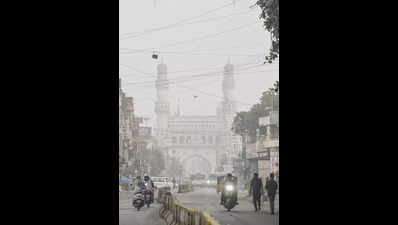Hyderabad: Winter temperatures in Telangana during 2024 were notably milder than the record lows of 2021 and at least 2° to 3° Celsius warmer than those recorded in 2022 and 2023, according to data from the India Meteorological Department (IMD) and the Telangana State Development Planning Society (TSDPS).
Climate experts attribute this trend to global climate change, leading to progressively milder winters over the years across the state.
Although some districts experienced chilly mornings and sporadic fog, temperatures largely stayed within moderate ranges.
An analysis by STOI based on the data shows that Jan, traditionally the coldest month, saw night temperatures dip to 13° Celsius in Hyderabad, while daytime highs ranged between 24° Celsius and 26° Celsius. This made it the coldest Jan in five years for the state capital.
In northern districts like Adilabad and Karimnagar, night temperatures fell as low as 9° Celsius, with Adilabad recording the state’s lowest at 7° Celsius. Thick fog enveloped these areas in the early mornings, significantly reducing visibility. Meanwhile, southern districts like Khammam and Nalgonda experienced milder conditions, with minimum temperatures staying between 12° Celsius and 15° Celsius.
However, winter in Hyderabad was cooler than in 2023 but warmer than the last three years, during which temperatures dipped below 8° Celsius. This year, night temperatures in the city consistently ranged from 13° Celsius to 15° Celsius, with areas like Kukatpally and Secunderabad reporting slightly cooler readings.
“The winter of 2024 in Telangana was characterised by mild conditions without significant cold waves or sharp temperature drops. The increased incidence of fog, especially in northern Telangana, is noteworthy as it could indicate subtle weather pattern changes,” an IMD official noted.
Experts pointed to broader climate trends affecting the state. “Telangana’s moderate winter temperatures reflect the global warming trend seen across India,” the IMD official added. “This year’s average temperatures were 2° Celsius to 3° Celsius higher, coupled with more frequent fog and cold spells.”
The rising frequency of foggy mornings, particularly in Adilabad and Karimnagar, underscores changes in seasonal characteristics. Ecologist Bhaskar Reddy N highlighted the need for action, stating, “The increased fog and warming temperatures are indicative of long-term climatic shifts driven by urban heat islands, unseasonal rains, and rising temperatures. It’s high time we address these factors to mitigate future impacts.”







